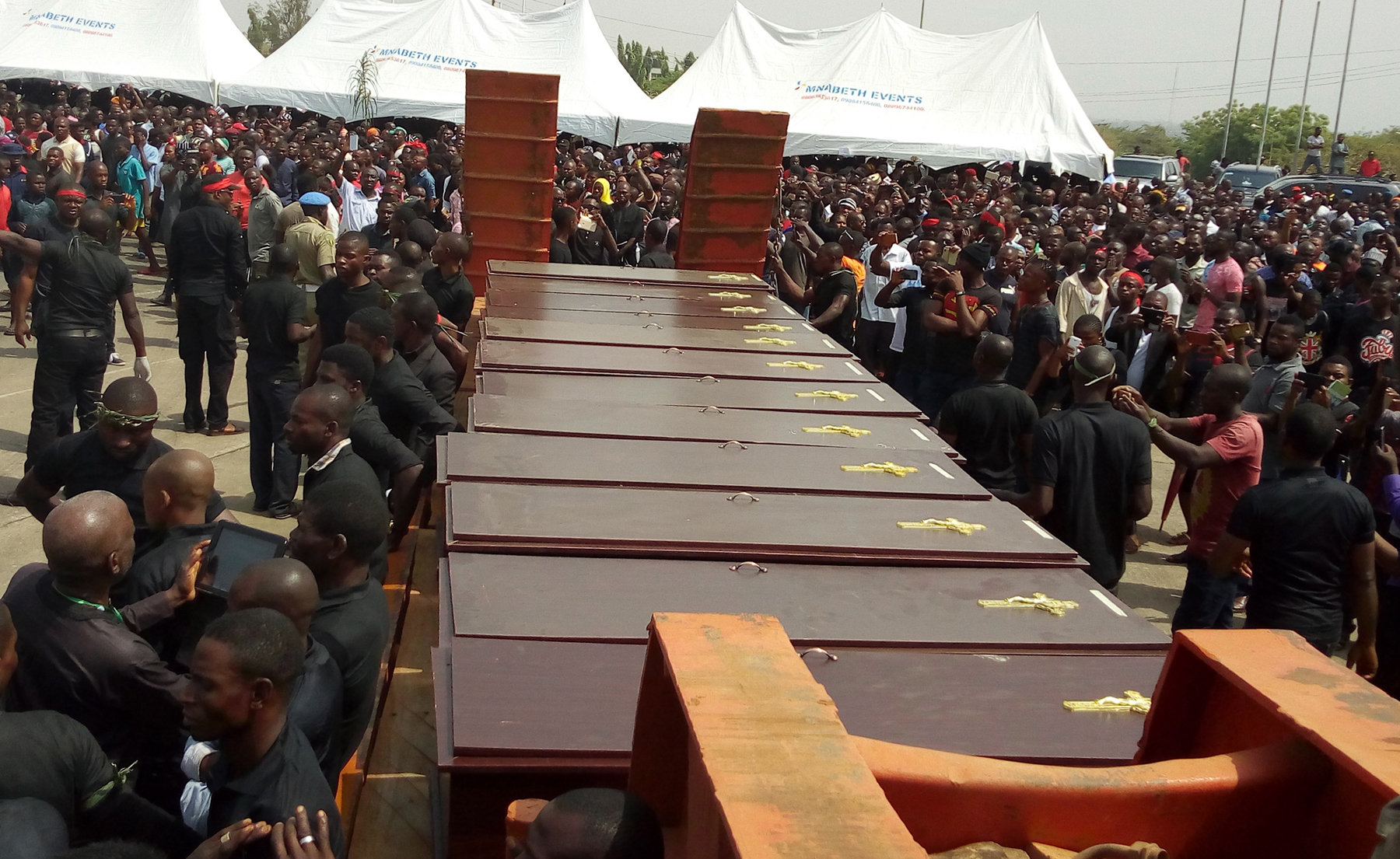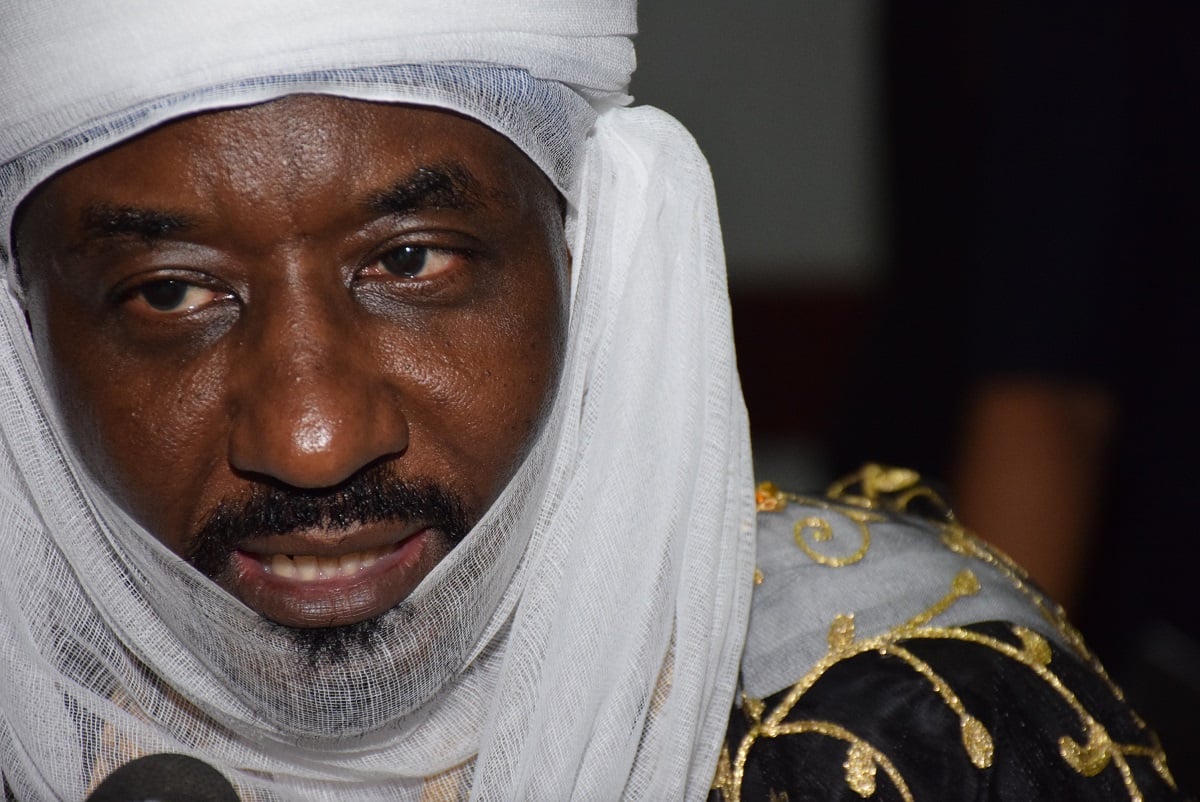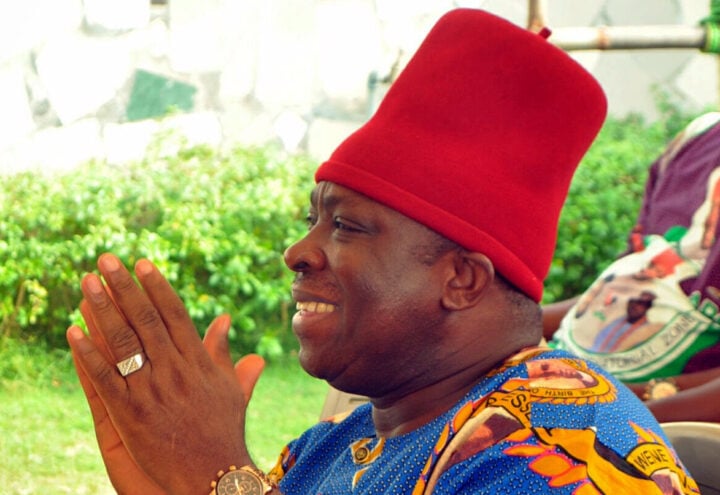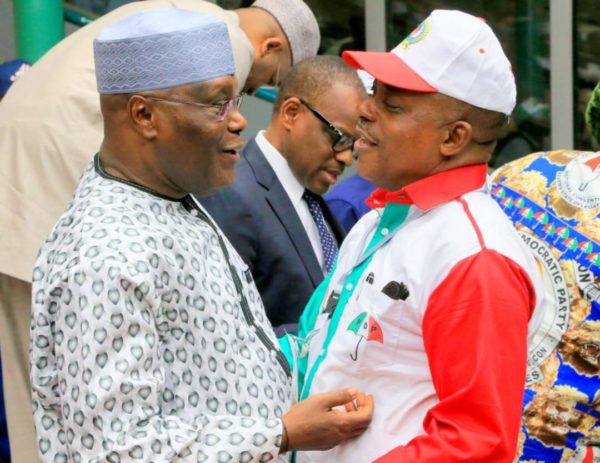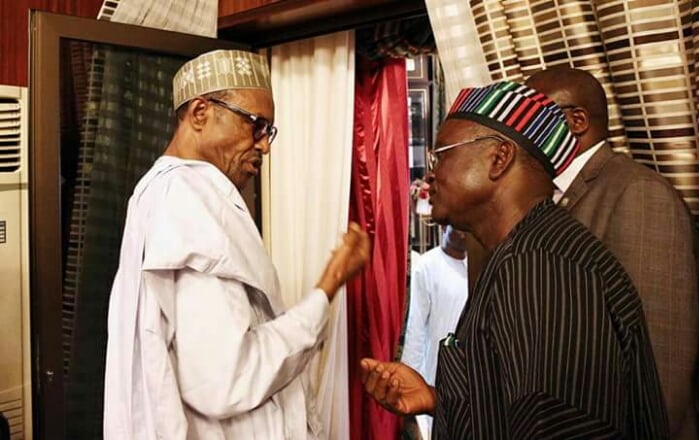Pic.13. Some of the corpses of the 73 killed persons killed during the Fulani Herdsmen attack on Benue communities in Guma and Logo Local Government Areas, during their funeral service at the IBB Square in Markurdi on Thursday (11/1/18).
00204/11/1/2018/Emmanuel Antswen/BJO/NAN
I got a call from a senior northern politician recently. He’s generally a man of peace and often calls to commend me anytime I write on “peace and unity”. But this was a different call. His tone was remarkably different and harsh as he spoke about the Benue killings. He spared little time for the obligatory I-like-your-article ice-breaker and rushed into a conversation. “Look Simon,” he half-shouted, “you journalists must put pressure on the president to act quickly and decisively. The herders are very confident he has their back. The security agencies are treating them like kings. Our people will have to start defending themselves. Nobody has monopoly of violence.”
My head dropped. Sadness overpowered me. These are the moments that test my faith in the precariously complex Nigerian project. It is particularly saddening that the Benue tragedy has provided a perfect setting for people to play politics of opportunism (2019 is around the corner, just you know), for people to rev up ethnic and religious sentiments, for people to queue behind those they perceive to be their kith and kin. Yet, for all you care, what we need most urgently is to prevent further bloodbath. Reprisals and more aggression will only turn Nigeria into another Somalia, the global capital of anarchy. We can do without that.
The point has been well made that President Muhammadu Buhari’s reaction to the killings has been too slow and too poor. The previous killings by Fulani herdsmen in Agatu (Benue) and Nimbo (Enugu) did not merit a stern response from the president, very unusual for a retired general who keeps celebrating his exploits in “keeping Nigeria one” during the civil war. Compare his attitude with how President Olusegun Obasanjo dealt decisively with the OPC menace in the south-west in 1999-2000 and you will see a world of difference. Buhari’s fire-brigade to the latest Benue killings, apparently in reaction to so much public outcry, is seen as a reluctant afterthought.
It is not as if the Fulani have not been at the receiving end too — they were victims of massacres in Bachama, Adamawa state, and Mambilla, Taraba state, last year, in which hundreds were killed. Curiously, these tragedies went unnoticed by the national media. Photos of dead Fulani bodies did not make the front page of newspapers, neither did the killings trend on Twitter. Sadly, Nigerians have reduced human lives to football, playing home and away matches in massacre. Who scored more goals? Who killed more people? How can “my people” protect themselves? Or how can “my people” revenge? That is the unfolding story of Nigeria. What an apology for a human society!
Advertisement
After the blame game, where do we go from here? How do we pick up the pieces, heal the wounds and prevent the next bloodbath? In preparing this article, I did a little internet search on clashes between farmers and herders in West Africa — in order to better understand patterns, undertones and antidotes. The findings were absolutely terrifying. On April 9, 1989, in Diawara, eastern Senegal, Fulani herdsmen and Mauritanian Soninke farmers clashed following a drought that created grazing challenges. Hundreds were killed. Over 250,000 persons were displaced. The ensuing Senegal-Mauritania Border War lasted for two years.
In March 2016, a violent clash between Fulani herdsmen and farmers in north-east Cote d’Ivoire led to 17 deaths, AFP reported. In May 2016, armed Bambara and Fulani groups clashed in Tenenkou, west Mopti, Mali, leading to 20 deaths. In November same year, 18 persons died in clashes between herders and farmers in Bangui, Niger Republic. In November 2017, nine persons died in the Kwahu East District of Ghana following clashes between Fulani herdsmen and villagers. A commenter named Yaa Nyamekye wrote on Ghanaweb.com: “Why should foreigners take over our lands! Fulani, Chinese and Nigerians have taken over Ghana!”
Back to Nigeria, farmers and herders have perennially clashed. As a kid in my village in the 1970s, I witnessed some of these confrontations. Herders seasonally invaded our farmlands to audaciously feed their cattle. At some point, village hunters were put on guard to repel them. Aggression, clashes and deaths have scaled up all over Nigeria in recent years. The herders are now acting lawlessly, destroying people’s livelihood, taking over public places and going scot-free. These incidents have become more highlighted under Buhari, who is also of the Fulani stock and a cattle rearer to boot. The conspiracy theory is complete.
Advertisement
The Benue killings, in which 73 farmers and family members were killed by herdsmen “because our cows were stolen”, have accentuated many issues. There are allegations that the president tacitly supports the activities of the herdsmen by failing to act with the same enthusiasm and determination he displayed in dealing with the Indigenous People of Biafra (IPOB). The killings have also offered opportunities for politicians to play 2019 politics — the same way Buhari’s APC used Boko Haram killings to slaughter President Jonathan in 2015. Those who enjoy toying with ethnic and religious emotions are also having a ball, particularly on social media.
Beyond the politicisation of the killings, however, there are matters we need to be dispassionate about if our interest is to resolve the crisis. The immediate causes can be traced to these factors: (1) geography/ecology (2) culture and (3) insecurity. But, evidently, leadership failure is at the centre of it all. I will try my best to explain my thoughts within the space constraints. My major objective today is to call for reason. If we are going to build lasting peace, we must disrobe ourselves of the pervasive political, ethnic and religious emotions currently at play. We need an open mind. More bloodshed may look appealing in the heat of the moment, but nobody will be safe in the end.
One, in terms of geography and ecology, climate change has forced a vast majority of the herdsmen to migrate downwards in search of fresh pasture in recent years. In an essay by Malcolm Fabiyi and Adeleke Otunuga, they said Nigeria has 22 million cows that consume about one billion gallons of water per day and 500 million kilograms of grass and forage crops. Lake Chad is drying up. Desertification and Boko Haram war have combined to drive herders increasingly southward since 2012. They are seeking survival. However, this has huge security implications. A proactive government would usually anticipate the consequences and develop appropriate plans and policies.
Two, culturally, the Fulani herders are nomadic. Ranching is alien to them. In the days when there was law and order in Nigeria — and I mean in the colonial era — we had grazing routes, complete with water supply, security, tax collectors and veterinary medical facilities. Now that all these have collapsed, the herders think they have a divine right to graze anywhere and nobody can stop them. Invading farms and wrecking the economy of farmers has become very normal for them. A proactive and responsible government will work at re-orientating the herders to embrace modern practices, deploying all moral suasion strategies to deal with the inefficient, outdated nomadic system.
Advertisement
Three, herders are at the mercy of rustlers who ambush them and steal their cattle. These criminal gangs are hardly apprehended or punished. Our security agencies are more competent in arresting bloggers and handcuffing them for “libel”. They have little competence in protecting the citizens despite the billions they get in budgetary allocations. Herders resort to arming themselves and deploying self-help since there is effectively no government. Unfortunately, both the criminal gangs and the menacing herdsmen never face the full weight of the law. The primary reason for having a government is to prevent anarchy. So where is government?
These are the things I think responsible leadership should offer. One, address the grazing crisis. The idea of creating “colonies” will work well in some areas but fail woefully in other areas because of historical divides. Government must get the buy-in of host communities. We must avoid trying to solve one problem and creating another. I repeat: government must tread carefully. Two, the herdsmen must be re-orientated to understand that we live in the 21st century and their “roaming culture” must be within the law. They have no right to carry on as if everywhere belongs to them. If everybody does what he likes, there will be no country left at the end of the day.
Three, those who fail to play by the rule must face the law. Nobody should ruin someone else’s farms or take lives and go scot-free. Four, conflict management must be central to policies and measures aimed at solving these problems. Government should design a system of early warning and a complaint/grievance management mechanism for herders, farmers and villagers. Aggrieved parties must be able to channel their grievances in a civilised manner rather than resort to self-help. Above all, leaders must genuinely work to promote justice and equity. They must cast aside their prejudices. If our leaders keep sleeping on the job, Somalia is sure to happen to us.
AND FOUR OTHER THINGS…
NORTH MY WILL
Advertisement
With Alhaji Ahmed Abubakar’s appointment as the DG of the National Intelligence Agency (NIA), the navy now remains the only security service not headed by a northerner (and for those who don’t know, chief of defence staff heads no service). Could it be that President Buhari can’t find any northerner yet to lead the navy? Even the major paramilitary services, which used to be manned by middle-belters for regional balancing, are now headed by the “core north”. I think this is a record. I’m not aware of any other time in our history when security has been so northernised. As someone who supports “balancing” because of our delicate national make-up, I’m scandalised. Insensitive.
METEORIC RICE
Advertisement
When I heard that rice exports from Thailand to Nigeria dropped from 1.23 million metric tonnes in 2014 to 23,192mt as at November 2017, I was over the moon. It was a confirmation that our rice policy is working, I concluded. But a colleague drew my attention to the figures coming from Benin Republic: as Nigeria’s imports were decreasing, Benin’s imports were increasing. To the best of my knowledge, most people in Benin eat local rice. The logical conclusion is that Benin’s imports were meant for the Nigerian market through the land border (complete the sentence!) By the way, contrary to my assertion last week, Thailand and Vietnam have missions in Nigeria. Apologies.
ZERO ZAMFARA
Advertisement
And so, only 24 candidates from Zamfara state passed the 2017 November/December senior school certificate examination of the National Examinations Council (NECO). In fact, the examination was taken by only 186 candidates in the state. The governor, Alhaji Abdul’aziz Abubakar Yari, is also the chairman of the Nigeria Governors Forum. He spends most of his time in Abuja and Saudi Arabia, and blames fornication for epidemics. He is a young man by some definition — he was elected governor in 2011 at 43. Maybe age is not the super solution to our leadership crisis. Yari will leave office next year, proud of himself that after eight years, only 24 candidates passed NECO. Disaster.
TRUMP’S TANTRUMS
Advertisement
The erratic US President Donald Trump never has any kind words for Africa. Reported to have called Africa a “shithole” (he denied using that word but said he used a “tough” word which he refused to disclose), Trump has come under attack from African leaders. As disgusting as Trump’s words are, maybe we also have to look in the mirror. Most Nigerians who migrate to the US do so for economic reasons. If our country was working — just the basics of stable electricity, good roads, quality education, security and good jobs — who cares about America? The ultimate solution to tackling racist countries is for us to put our house in order. Trump’s words really hurt. Demeaning.
Add a comment

